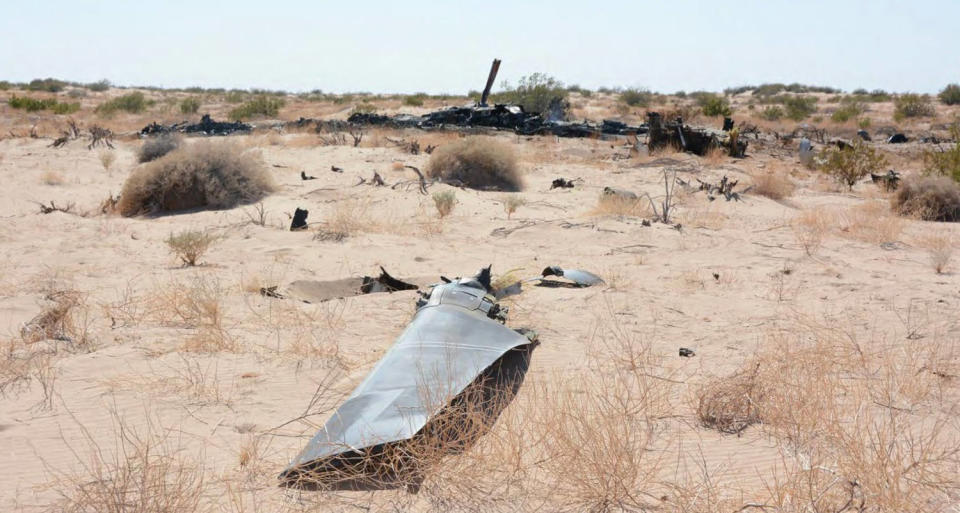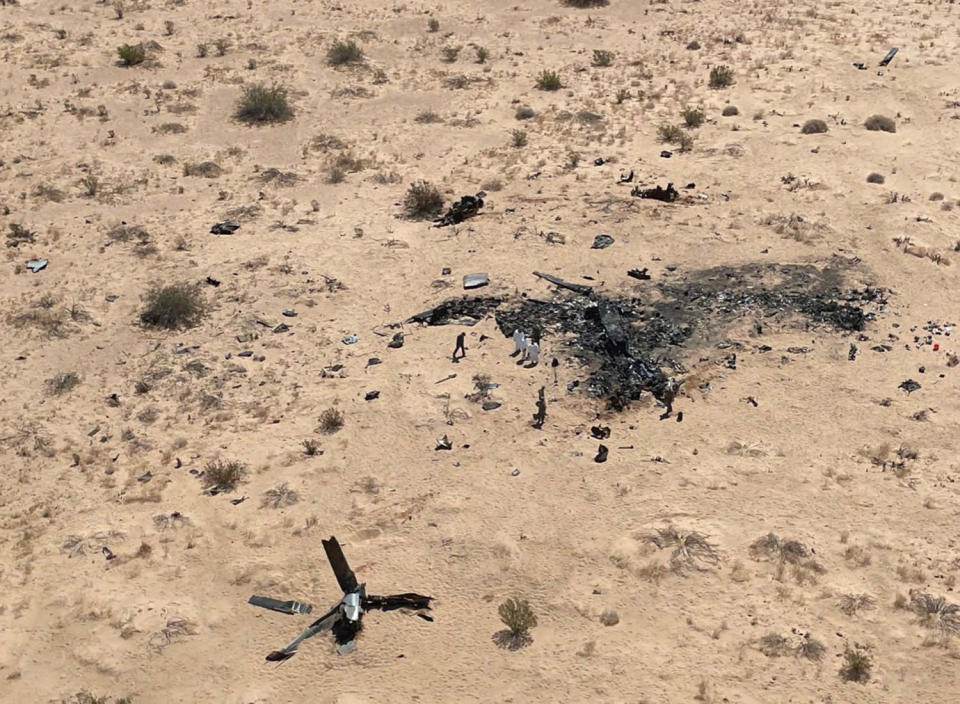Families of Marines who died in an Osprey crash sue Bell Textron, Boeing and Rolls-Royce
The families of four Marines who died in a V-22 Osprey crash in California on June 8, 2022, have filed a lawsuit accusing the manufacturers of the twin-rotor military aircraft of negligence.
In a federal lawsuit filed Thursday in California, the plaintiffs allege that the makers of the aircraft, Bell Textron and Boeing, and the maker of its engine, Rolls-Royce, failed to make “truthful statements to the government and to service members about the design, operation, and safety of V-22 Osprey aircraft.”
The complaint alleges that in the California crash of the unique aircraft, which can rise vertically like a helicopter and fly horizontally like a plane, there were two systems that failed and the failures may result in a recurrent mechanical problem that can cause it to crash.
Boeing and Rolls Royce did not immediately respond to requests for comment.
A Bell Textron spokesperson said the company "cannot comment on matters of litigation.” A spokesperson for the Naval Air Warfare Center Aircraft Division that oversees the V-22 Joint Program Office said, “It is NAVAIR’s policy not to comment on pending litigation.”
Amber Sax, whose husband, Capt. John Sax, 33, died in the California crash, said in a statement that her motivation in filing suit was to get answers for others at risk. “Our military members deserve equipment and aircraft free of failures, especially failures that can cause the loss of their lives.” As a widow with two children, she said, “I should have been growing old with my husband. Our two children shouldn’t be growing up without their father.”

The lawyer representing the families, Tim Loranger, said in a press release, “For years Bell-Boeing and others have asserted that this aircraft and all of its systems are safe, yet the facts keep telling a different story.”
From March 2022 to November 2023, 20 service members died in four fatal Osprey crashes. The U.S. military grounded the entire fleet of about 400 V-22 Ospreys used by the Navy, the Marines and the Air Force after the crash of an Air Force Special Operations Command Osprey off Japan last November killed eight airmen. The groundstop was lifted in early March, and the Ospreys are gradually returning to service.
The military says it has identified and believes it has solved a recurrent problem with the clutch in the Osprey’s rotor gearbox that it says caused the June 2022 crash in California, but it has still not determined root causes for the Osprey’s problems. (That crash killed five Marines; the family of one of them is not a plaintiff in the lawsuit.)
According to investigators, the California crash occurred after the aircraft experienced something called a dual “hard clutch engagement,” which is when the “clutch releases from the rotor system and suddenly reengages,” leading to a loss of lift and the risk of a sudden drop.
The Osprey fell so fast, investigators said, that the experienced pilots did not have time to make any radio communications. The fire from the crash was so hot that it destroyed the aircraft’s black box.
The clutch problem was not new. There were 12 hard clutch engagements from 2010 to 2020, according to data from the Pentagon’s V-22 Joint Program Office, but none were fatal. Since the California crash, however, there have been another six. The last one was in January 2023.


The plaintiffs cite the clutch issue and also allege a new problem, arguing the Osprey has a problem with it Interconnect Drive System (ICDS), which they say happened in the California crash after the dual hard clutch engagement. The ICDS transfers power from one rotor engine to both rotors in the event that the other engine fails. The complaint alleges the ICDS is “defective and unreasonably dangerous.”
Loranger said, “We are going to look at all of the relevant components individually and as a system to determine if there was a defect.” Loranger added that the repeat clutch problems suggest a recurrent mechanical problem. “Whether the problem lies with the ICDS or its integration with other components in the system remains to be seen.”
The two most recent crashes are still under investigation and no definitive causes have been disclosed.
NBC News reported that after the Air Force crash in Japan in late 2023 investigators were focused on the aircraft’s proprotor gearbox. Air Force officials have said the crash was likely due to a material failure and they have identified the part that failed but say they will not announce the finding publicly or disclose the timeline of events that led to the crash until their investigation is complete. The program manager for the V-22 called the part failure “unprecedented” in a March briefing.
Air Force Special Operations Command spokesperson Rebecca Heyse said the investigation into the Japan crash is still in process, telling NBC News: “There isn’t a definitive timeline for when that report will be completed and approved for release. The [Accident Investigation] board is in the later part of their investigation. Once complete, the Board President will provide an in-person briefing to the families of the fallen before the information is released to the public.”
Three Marines died in the other most recent crash, in Australia in August 2023. It also remains under investigation.
Brett Strickland, of New Mexico, whose son Evan died in the 2022 California crash, is a plaintiff in the lawsuit filed Thursday. “We have been trying to get answers and push to get the actual reason and cause for the crash,” he said, “and we don’t feel that they know why this is happening.”
Strickland says his focus is on other families. “We don’t want other families to get a knock on the door in the middle of the night,” he said.
This article was originally published on NBCNews.com

